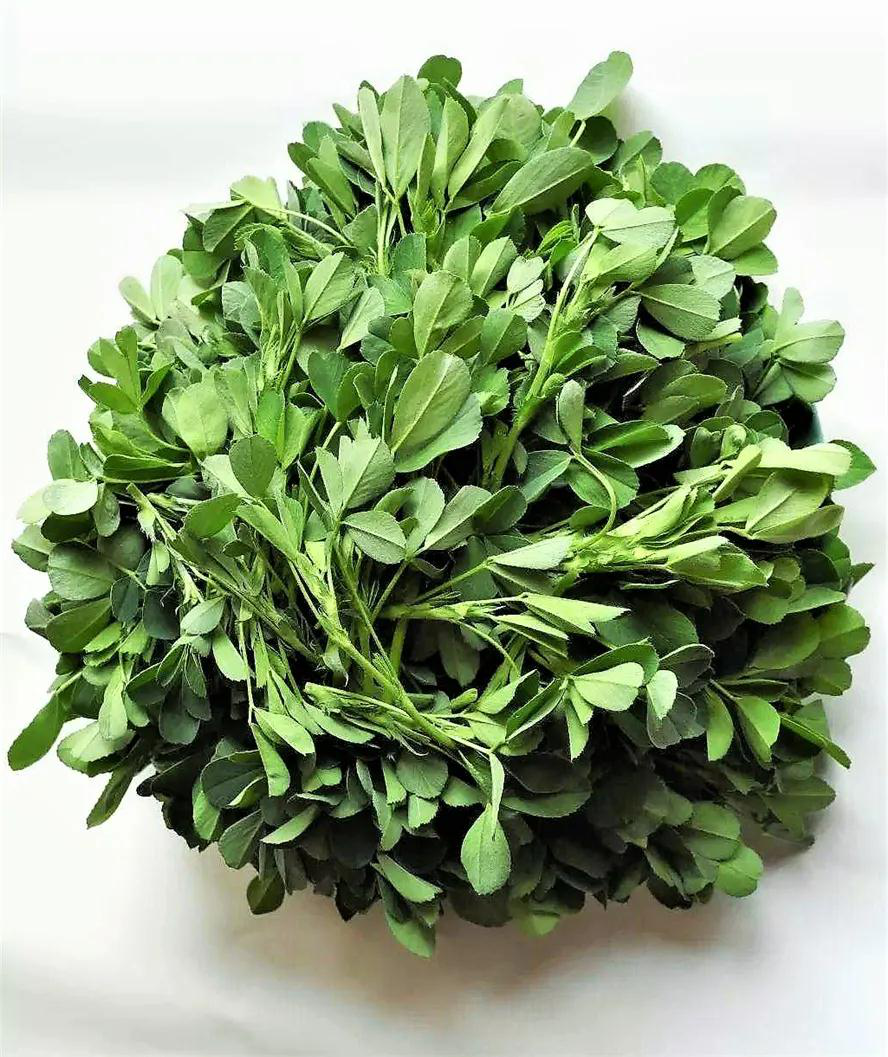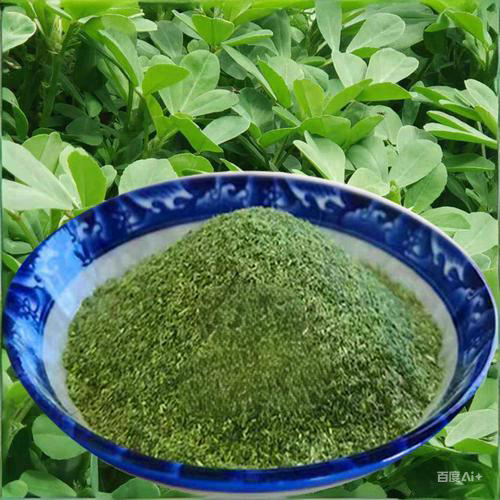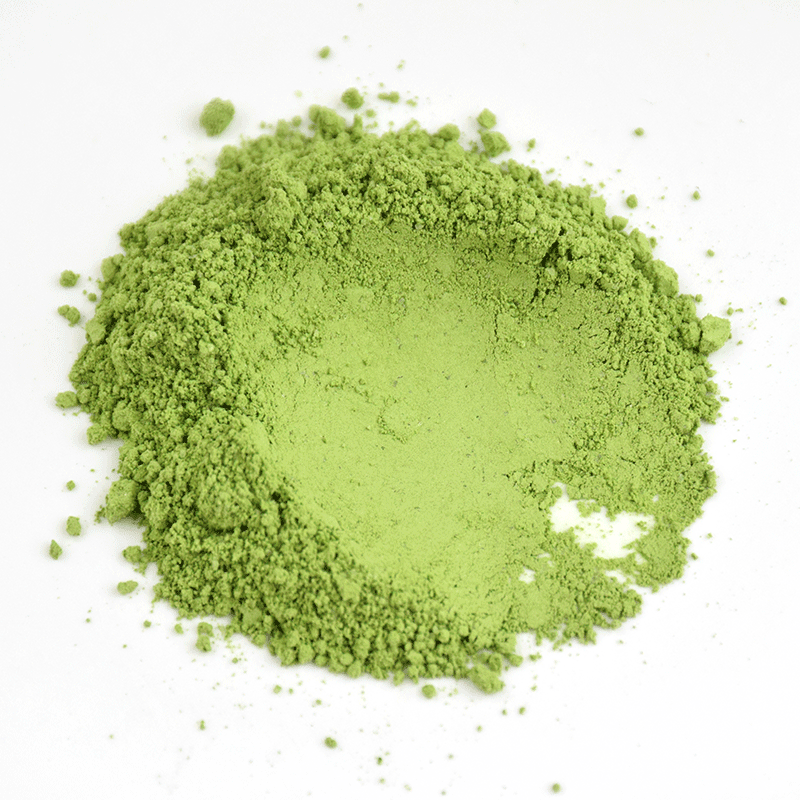Alfalfa meal is a green powdery substance made from the whole plant of the leguminous plant Medicago sativa through processes such as cleaning, drying and grinding. The following is a detailed introduction to alfalfa meal:
I. Origin and Distribution
The raw materials of alfalfa meal are mainly produced in Northwest, North, Northeast China and the Jianghuai River Basin. Among them, large-scale planting bases have been established in the Liupan Mountain area of Ningxia. Shaanxi, Gansu, Shanxi, Xinjiang and other places are also the main production areas of alfalfa meal
Ii. Components and Characteristics
Alfalfa meal is rich in nutrients, including:
l Flavonoids: With a content ranging from 10% to 80%, they contain isoflavones and coumarin derivatives and have a protective effect on the cardiovascular system.
l Saponin component: Up to 20%, with multiple biological activities.
l Triterpenoids: They have anti-inflammatory and antibacterial effects
l Dietary fiber: With a water-holding capacity of 5.57g/g, it helps promote intestinal peristalsis and improve constipation
l Immune-active polysaccharides: Can enhance immune function.
l Protein: The content is between 15% and 26.2%, and the lysine content is 4 to 5 times that of corn
l Vitamins and minerals: such as vitamin K, vitamin B12, iron, calcium, etc., have the functions of replenishing blood and stopping bleeding, promoting bone growth and development, etc
Iii. Core functions and effects
1. Supplement diverse nutrients to meet daily needs
l Rich in plant protein (15%-20%), it can serve as a source of protein supplementation for vegetarians and people on a fat loss diet. Eating it with grains can enhance the utilization rate of protein.
l It has a prominent vitamin K content (approximately 300-400μg per 100 grams), which helps with blood coagulation and bone health (promoting calcium absorption). It contains vitamins A, C, E and B vitamins simultaneously, meeting the daily antioxidant and metabolic regulation needs.
Rich in minerals (calcium, iron, magnesium, potassium), iron can help improve mild iron deficiency anemia (suitable for women and teenagers), and its calcium content is close to that of milk, which helps with bone development and maintenance.
2.Promote intestinal health and improve digestive function
It is rich in dietary fiber (about 25-30 grams per 100 grams), including both soluble and insoluble fiber.
Insoluble fiber can promote intestinal peristalsis, increase the volume of feces and relieve constipation (suitable for people who sit for long periods and have a refined diet).
Soluble fiber can serve as the “food” for intestinal probiotics, regulating the balance of intestinal flora and improving problems such as bloating and indigestion
3.Assist in regulating metabolism and protect the cardiovascular system
It contains phytochemicals such as flavonoids and saponins, which can help lower low-density lipoprotein (” bad cholesterol “) in the blood, reduce lipid deposition, and has a certain protective effect on cardiovascular health.
Dietary fiber can delay the absorption of sugar and prevent rapid fluctuations in blood sugar, making it suitable for people with high blood sugar as a daily dietary supplement (it cannot replace medication).
4.Antioxidant and immunity-boosting
5.Vitamin C, E and flavonoids and other components have antioxidant effects, which can eliminate free radicals in the body, reduce oxidative damage, assist in enhancing the body’s immunity, and lower the probability of catching a cold, inflammation and other diseases.
Iv. Application Fields
(1)Food industry
As a nutritional fortifier, it is added to infant rice cereal, meal replacement foods, etc.
As a carrier of functional components, it is used in solid beverages (with an addition amount of 3% to 5%), pressed candy (with an addition amount of 15% to 30%), etc
(2)Medicinal value
Traditional medicine holds that alfalfa has the effects of clearing heat, promoting diuresis, relieving cough and asthma.
Modern research has confirmed that its flavonoid components have a protective effect on the cardiovascular system. The stem and leaf powder has shown inhibitory effects on Salmonella and Escherichia coli in in vitro experiments.
(3)Feed additive
Alfalfa meal, as a feed raw material, is rich in crude protein, vitamins, amino acids, saponins, polysaccharides and other active components, and is widely used in agricultural production.
It can enhance the reproductive performance of sows and improve the quality of pork. Adding 20% to 30% to the feed of fattening pigs can increase the lean meat ratio and fatty acid content.
The core value of alfalfa meal is that it is a “natural nutritional supplement”, especially suitable for vegetarians, people with weak intestinal function, and those who need to regulate their metabolism to consume daily. By supplementing nutrition, improving the intestines, and assisting in regulating metabolism, it achieves a gentle health-preserving effect.
Contact:Judy Guo
WhatsApp/we chat :+86-18292852819
E-mail:sales3@xarainbow.com
Post time: Nov-26-2025



